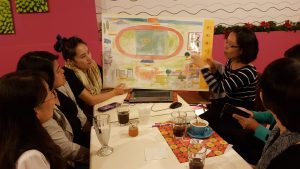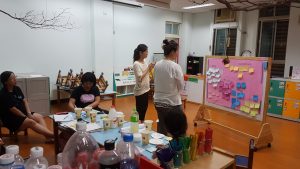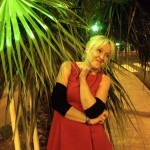 In Taiwan children spend time outdoors on average only 29 minutes a day and they are highly physically active only 23 minutes a day. In several pre-schools, the teachers have chosen as their development task increasing both outdoor activities and physical activity. In the picture there is a map of the pre-school yard. Before children go out, the map and outdoor possibilities are discussed with children to enrich children’s ideas. The time of outdoor activities has been extended from 30 minutes to one hour. Both children and teachers feel good. The weather is hot and the children sweat a lot! All teachers are outdoors together with children. After washing up children come indoors and the map is used again to deepen the experiences. In the photo, teachers of the group share their experiences with the teachers of other pre-schools and new ideas are developed. For example, the heavy rubber tiles that have been removed may not be thrown away, they can be used in building, math and exercise. The map can be left on floor for children to play and deepen their outdoor horizon.
In Taiwan children spend time outdoors on average only 29 minutes a day and they are highly physically active only 23 minutes a day. In several pre-schools, the teachers have chosen as their development task increasing both outdoor activities and physical activity. In the picture there is a map of the pre-school yard. Before children go out, the map and outdoor possibilities are discussed with children to enrich children’s ideas. The time of outdoor activities has been extended from 30 minutes to one hour. Both children and teachers feel good. The weather is hot and the children sweat a lot! All teachers are outdoors together with children. After washing up children come indoors and the map is used again to deepen the experiences. In the photo, teachers of the group share their experiences with the teachers of other pre-schools and new ideas are developed. For example, the heavy rubber tiles that have been removed may not be thrown away, they can be used in building, math and exercise. The map can be left on floor for children to play and deepen their outdoor horizon.
Author Archives: reunamo
Riverplan in Taiwan
 In Taiwan, the pre-schools have been using the results of the 2015-2016 data collection in their development of the activities. The development model is Riverplan. In the picture, the teachers are planning to increase the support of play. In the Riverplan, north bank is for the opportunities and the south bank are the dangers of the trip. In the river there is the process. First we have to make a good map of the environment we are about to travel. Then we need to clarify what tools and skills we need for a successful journey. Furthermore, in a meaningful trip the differences and personal interests need to be considered if we want the trip to be meaningful for everybody (participation). Finally, we need to consider how we can share our fruits of the trip for everybody to enjoy.
In Taiwan, the pre-schools have been using the results of the 2015-2016 data collection in their development of the activities. The development model is Riverplan. In the picture, the teachers are planning to increase the support of play. In the Riverplan, north bank is for the opportunities and the south bank are the dangers of the trip. In the river there is the process. First we have to make a good map of the environment we are about to travel. Then we need to clarify what tools and skills we need for a successful journey. Furthermore, in a meaningful trip the differences and personal interests need to be considered if we want the trip to be meaningful for everybody (participation). Finally, we need to consider how we can share our fruits of the trip for everybody to enjoy.
Funding for the study of self-regulation
Our doctoral student Jouni Veijalainen has been granted by Jenny and Antti Wihuri foundation with a 24 000 euro funding. The grant is for Jouni’s doctoral dissertation “Children’s self-regulation skills in day care”. Jouni’s data is from the 2015 data collection. In his dissertation Jouni combines children’s evaluated self-regulation skills with the observed activities, which makes it possible to study how the self-regulation skills are related to everyday activities and peer contacts in day care centres. Self-regulative skills are essential when children get practice to steer their own and also others life for a sustainable well-being.
Scientific justification for the recommendations for physical activity in early childhood
The recommendations for physical activity in early childhood have been based largely on scientific justification. The articles for the Scientific justification for the recommendations for physical activity in early childhood (2016, Ministry of Education and Culture 2016:22) have just been published. The Orientation project results and insight have been a major contributor in this process, see:
Laukkanen, A., Määttä, S., Reunamo, J., Roos, E., Soini, A. and Mäki, P. Perheen tärkeä rooli [The important role of the family], p. 22-26.
Reunamo, J. Lapsilähtöinen toimintakulttuuri edellyttää lapsen kuuntelua [Child-initiated action culture requires listening the child], p. 27-31.
Iivonen, S., Laukkanen A., Haapala, A. and Reunamo, J. Motoristen taitojen kehitys [The development of motoric skills], p. 32-37.
Soini, A., Laukkanen, A., Mäki, P. and Reunamo, J. Fyysistä aktiivisuutta ja liikkumista edistävä ympäristö [An environment that enhances physical activity], p. 44-48.
Kyhälä, A-L. and Soini, A. Organisoitu liikunta [Organized excercise], p. 49-53.
Reunamo, J. and Kyhälä, A-L. Liikkuminen varhaiskasvatuspäivän osana [Physical activity as part of everyday activities in early childhood education], p. 54-58.
Hopefully the articles will be translated in English as soon as possible!
Recommendations for physical activity in early childhood
The new Recommendations for physical activity in early childhood have been published in 7th September 2016. The recommendations for physical activity in early childhood inform about the amount and type of physical activity for the under eight-year-olds, roles of the physical, psychological and social environments, and planning and implementation of guided physical exercise and education on exercise as part of early childhood education. The Orientation project results and insights have been integrated in the recommendations in many ways. Hopefully we get the English translation for the recommendations as soon as possible!
A publication on bullying
The book Contemporary Perspectives on Research on Bullying and Victimization in Early Childhood Education has just been published. The book includes our article Openness and Agency as Strategies for Addressing Bullying. The authors are Jyrki Reunamo, James Ko, Doris Cheng, Hui‐Chun Lee, Li‐Chen Wang, and Essi Salminen. The yearbook is an essential reference in Early Childhood Education research. This is a major recognition for the work and research of our project. Our article presents a rare perspective on children’s strategies to confront bullying. We also see how these strategies are reflected in the everyday activities and interaction. The book can be bought online at the Information Age Publishing’s website. The direct link is: http://www.infoagepub.com/products/Contemporary-Perspectives-on-Bullying-and-Victimization-in-Early-Childhood-Education.
A grant for our project
The Finnish National Board of Education has granted our project on Progressive Feedback for 280 000 euro. The grant was clearly the largest sum funded of all applications. This funding is a major support and recognition of our project. The participating municipalities include Espoo, Hyvinkää, Hämeenlinna, Järvenpää, Kerava, Mäntsälä, Nurmijärvi, Sipoo, Turku and Vantaa. The project coordinating municipality is Kouvola. Thank you for the team for a succesful project! The funding will help us to make the best of progressive feedback. We will concentrate on accuracy, depth, topicality and feedback.
Progressive feedback as a permanent practice
In Finland, in municipalities Espoo, Helsinki, Hyvinkää, Hämeenlinna, Järvenpää, Kerava, Mäntsälä, Nurmijärvi, Sipoo, Turku and Vantaa, we make the progressive feedback a permanent practice. The observer training starts in January 2017 and the building and testing of the needed infrastructure and tools starts immediately. From September 2017 onward, every day 180 randomized observations is conducted in different municipalities. When we merge the observation data with skills and learning environment evaluations, we get a real time feedback of the essential processes of early childhood education in Finland. This gives us an opportunity to get hold of these processes and change them in a conscious way. Furthermore, we get instant feedback about the effects of the development work almost in real time, which can be shared and further developed by the community and educators.
Funding for study of multicultural children
 Alli Paasikivi foundation has awarded the 2016 grants. Outi Arvola received funding (21 000 euro) for her research, where she studies the Orientation project results from the point of view of the multicultural children and their families. At the moment, Outi is working with the support needed for different families with a multicultural background and probably the multicultural children’s everyday experiences are the next topics of her research. Congratulations for Outi! The funding is an essential help in accomplishing the needed deepness and validity of this timely topic.
Alli Paasikivi foundation has awarded the 2016 grants. Outi Arvola received funding (21 000 euro) for her research, where she studies the Orientation project results from the point of view of the multicultural children and their families. At the moment, Outi is working with the support needed for different families with a multicultural background and probably the multicultural children’s everyday experiences are the next topics of her research. Congratulations for Outi! The funding is an essential help in accomplishing the needed deepness and validity of this timely topic.
Pedagogical Documentation in Early Years
Kati Rintakorpi’s and Jyrki Reunamo’s article Pedagogical documentation and its relation to everyday activities in early years has been accepted for publication in the Early Child Development and Care journal. Pedagogical documentation was related to participative, drama education, media-education and deeply processed pedagogical planning. It is remarkable that the pedagogical documentation evaluated by the team educators was positively correlated with the independently measured observation. The observers and evaluators had no knowledge and access to the other measurement data. Thus, the correlation between learning environment evaluation and observation must describe some real connections between pedagogical documentation and children’s everyday activities (we have to consider intermediate variables). For example, pedagogical documentation was positively connected with children’s increased happiness, joy and satisfaction. In these groups also children’s involvement in the activities tended to be higher. These results are among the first statistically significant results describing the connection between pedagogical documentation and children’s everyday experiences.